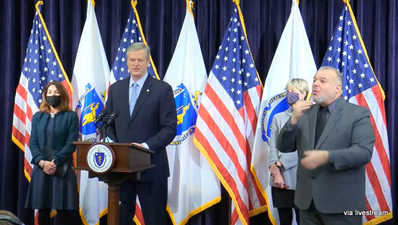State Orders 26M Rapid Tests, Changes Guidance on PCR Testing
 |
| Gov. Charlie Baker on Tuesday says the state has ordered 26 million iHealth tests for use in school districts. |
BOSTON — The state has ordered 26 million rapid-result tests over the next three months with a priority on public schools and day care settings.
Gov. Charlie Baker on Tuesday morning said the iHealth tests for COVID-19 will be received in rolling shipments with amounts that will vary according to production schedules.
This new order is on top of the 2.1 million iHealth tests distributed in December to 102 communities before the holidays and the 200,000 for educators after the winter break.
The announcement comes in tandem with an advisory from the state Department of Public Health affirming the accuracy of the rapid-result antigen tests and "clarity" surrounding the need for PCR tests at overwhelmed testing centers around the state.
"We've heard from many of our testing sites, that they're seeing increasing volumes of people who are seeking PCR tests specifically because their employer or their school, or their child-care center is requiring a PCR test to return from isolation," Baker said. "To be clear, DPH doesn't recommend that employers or schools or child-care providers require a test to return from isolation after having COVID. However, if they do require testing, DPH recommends they do not require a PCR test."
Public health officials are advising PCR tests only when someone exhibits symptoms related to the novel coronavirus or if they have had close contact with an infected individual. They are not recommending PCR tests for return to work after isolation. PCR tests take up to 72 hours while rapid tests take 15 minutes.
Baker said distribution of the iHealth tests will depend on shipments but believed they would take the state through the end of March at least. Secretary of Health and Human Services Marylou Sudders said the goal will be put get the K-12 school system through the end of the school year.
"We want to ensure that we have sufficient rapid antigen tests for both schools through the school semester through June, as well as for early education care," she said.
The governor spoke about the difficulty of acquiring rapid tests compared the easy access to cheap and effective tests in Europe to the handful of companies approved to manufacture tests in the United States.
"For a long time there was only one and, at this point in time, there's still only a handful," he said. "That all by itself, during a period like this, creates challenges associated with accessing tests."
The governor said he had also activated another 500 Guardsmen on top of the 500 already activated to assist health-care facilities struggling with short staffing because of the omicron variant.
He encouraged residents to get vaccinated and/or boosted as the best method of fighting off infection.
"Massachusetts continues to lead the nation and getting our residents vaccinated with over 5.1 million residents fully vaccinated," he said. "And today, on average, Massachusetts is still administering between 40,000 and 50,000 shots a day. There is still steady demand out there. ...
"Vaccines and boosters work. The data on this is unassailable at this point in time, they've been a game changer with respect to this pandemic. Getting vaccinated and boosted remains your best possible protection from getting really sick."
In response to questions about allowing schools to go remote during this surge in positive cases, Baker again said the objective is to keep children in school this year.
"Our view is we should be doing everything we can to make sure that kids get that 180 days of in-person learning because it's critically important not just to their educational development, but to their development period," the governor said. "And that's been demonstrated by what happened over the course of the past two years."
Tags: COVID-19,
More Coronavirus Updates
Keep up to date on the latest COVID-19 news:

